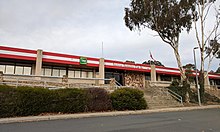Austrian Australians
Austrian Australians are Australian citizen of Austrian national origin or ancestry, or a permanent residents of Australia who have migrated from Austria. There are thousands of Austrian Australians, with many tracing their history to ancestors who arrived in the gold rush during the 1850s. Others came in the aftermath of World War I; during the war, non-naturalised Austro-Hungarians in Australia were interned. The 1920 Immigration Act prevented the arrival of more Austrians, and by 1933 just 286 Austria-born people were present in Victoria alone.[2]
| Total population | |
|---|---|
| Austrian 17,010 (by birth, 2011) 42,341 (by ancestry, 2011)[1] | |
| Regions with significant populations | |
| New South Wales, Queensland, Victoria | |
| Languages | |
| Australian English · Austrian German | |
| Religion | |
| Christianity, Judaism |
In World War II, and following the Nazi take-over of Austria, a sizeable number of Austrian Jews fled towards Australia. By 1942, there were over 2,000 Austrian Jews throughout the country. The number of Austrians living in the state of Victoria peaked in the 1960s at 8,615, then declined in the decades to come. As of 2006, a total of 4,913 Austrian-born Victorians were recorded.
In terms of religion, most are Roman Catholic, followed by Irreligion.
Notable people

- Peter Abeles
- Judy Cassab
- Manfred Clynes
- Ignaz Friedman
- Michael Gawenda
- Gerald Ganglbauer
- Martin Glaessner
- Maximilian von Götzen-Itúrbide
- Richard Goldner
- Nick Greiner
- Eric Gross
- Stefan Haag
- Louis Kahan
- Dick Klugman
- Monika Kos
- John Newman
- Marlene Norst
- Gustav Nossal
- Heinz Riegler
- Les Rusich
- Harry Seidler
- Peter Singer
- Franz Stampfl
- John Hans Stroh
- Melissa Tkautz
- Eugene von Guerard
- Markus Zusak
See also
References
- "The People of Australia – Statistics from the 2011 Census" (PDF). Australian Government. Archived from the original (PDF) on 14 July 2014. Retrieved 19 March 2015.
- History of immigration from Austria
